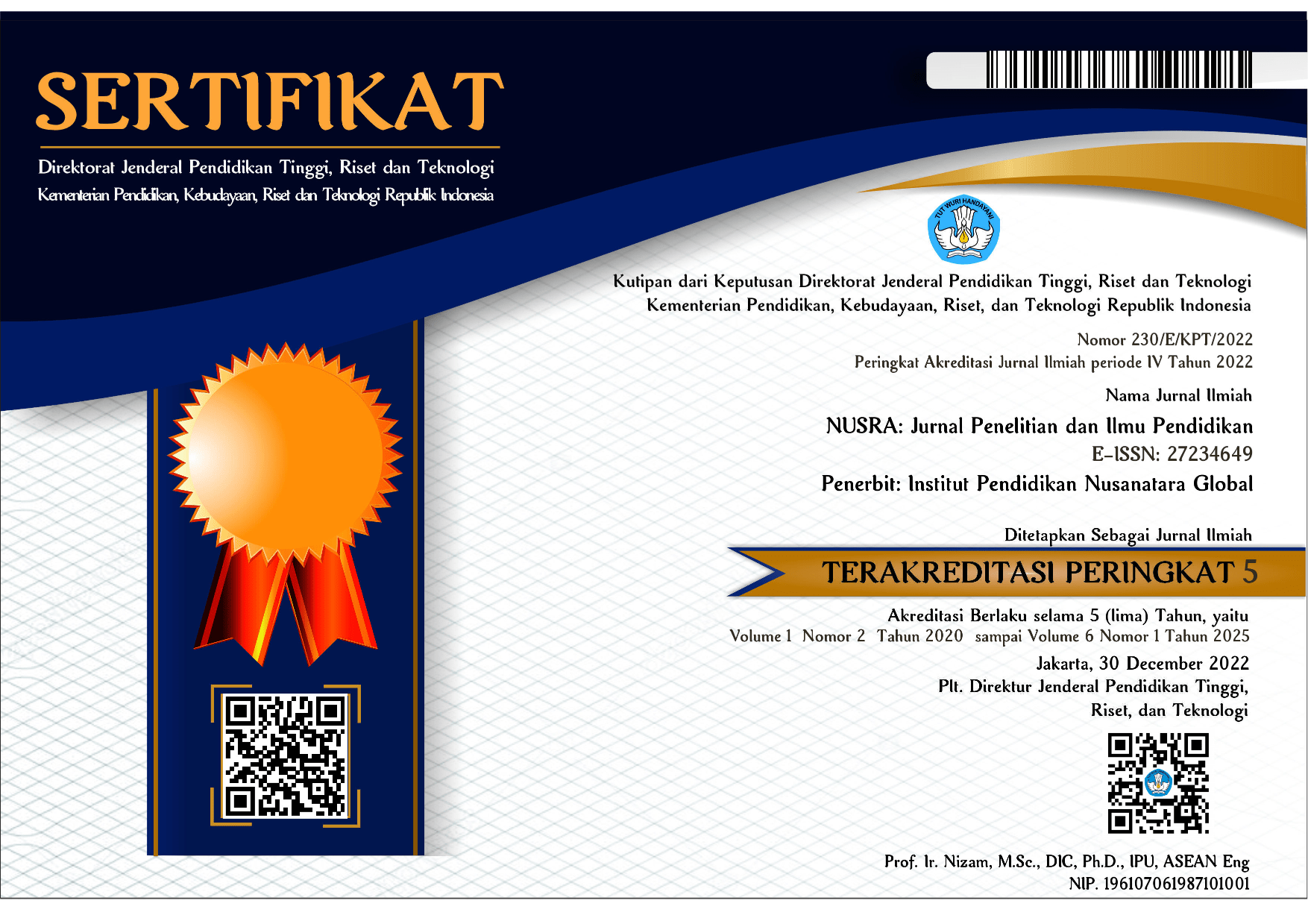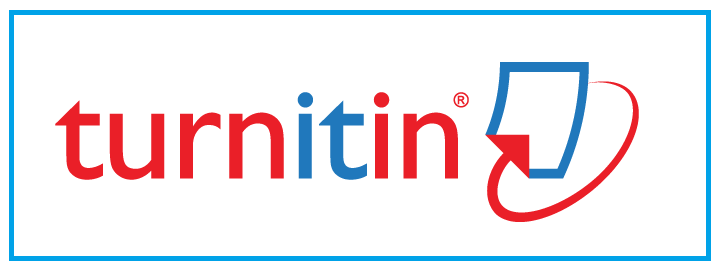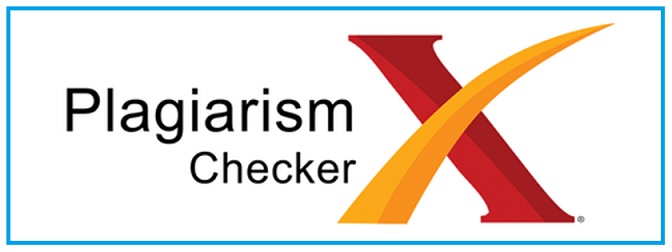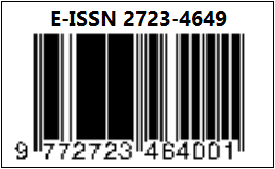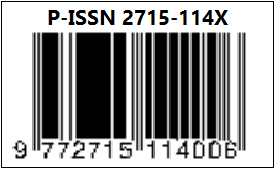Penerapan Model Problem Based Learning Dengan Metode Couple Discuss Learning Terhadap Keterampilan Kolaborasi dan Hasil Belajar Kognitif Peserta Didik
DOI:
https://doi.org/10.55681/nusra.v5i4.3537Keywords:
Problem Based Learning, Couple Discuss Learning, Collaboration Skills, Cognitive Learning OutcomesAbstract
The issues in this research are rooted in the still low collaboration skills and cognitive learning outcomes of students that do not meet the minimum completeness criteria (KKM) at SMAN 1 Jatiwaras. The aim of the research is to determine the effect of implementing the problem-based learning model with the couple discussion learning method on students' collaboration skills and cognitive learning outcomes. The research method used is a quasi-experiment with a non-equivalent control group design, with data collection techniques including a Guttman scale questionnaire and multiple-choice tests. The population in this study consists of all eleventh-grade students who are taking the economics specialization, totaling 168 students. The research sample includes class XI-7 as the experimental class and XI-10 as the control class, with sampling conducted through purposive sampling, resulting in 34 students from each sample class. The research results were analyzed using multivariate analysis of variance (MANOVA). The results of the first study show a significance value of 0.001 < 0.05, which means there is an effect of the PBL model with the couple discuss learning method on collaboration skills. The second study shows a significance value of 0.003 < 0.05, indicating an effect of the PBL model with the couple discuss learning method on cognitive learning outcomes. Additionally, the third study shows a significance value of 0.001 < 0.05, which means there is an effect of the PBL model with the couple discuss learning method on both collaboration skills and cognitive learning outcomes.
Downloads
References
Ayun, Q. (2021). Analisis Tingkat Literasi Digital dan Keterampilan Kolaborasi Siswa dalam Pembelajaran IPA Kelas VII Secara Daring. Jurnal Didaktika Pendidikan Dasar, 5(1), 271–290.
Ching, D. A. (2020). Two Cubed Approach in a Collaborative Classroom and the Enhanced Algebra and Social Skills of College Students. Universal Journal of Educational Research, 8(10), 4920-4930.
Devi, R. S., Mulyasari, E., & Anggia, G. (2023). Peningkatan Keterampilan Kolaborasi Peserta Didik Melalui Penerapan Model Kooperatif Tipe Group Investigation Berbasis Pembelajaran Berdiferensiasi Pada Mata Pelajaran IPA di Sekolah Dasar. Didaktik: Jurnal Ilmiah PGSD FKIP Universitas Mandiri, 9(1), 517-526.
Hartina, A. W., Wahyudi, & Permana, I. (2022). Dampak Problem Based Learning Untuk Meningkatkan Keterampilan Kolaborasi dalam Pembelajaran Tematik. Journal of Education Action Research, 6(3), 341-347. https://dx.doi.org/10.23887/jear.v6i3.
Jauhari, L., & Pujianto. (2023). Keefektifan Pembelajaran Kooperatif Tipe Think-Pair-Share Ditinjau dari Peningkatan Keterampilan Berfikir Kritis Peserta Disisk SMA. Jurnal Pendidikan Fisika, 88.
Jualianingsih, Rahmah, N., & Fitria, I. (2022). Penerapan Problem Based Learning (PBL) Berbasis Diskusi untuk Meningkatkan Hasil Belajar Peserta Didik SMK Negeri Alu Kab Polewali Mandar Sulawesi Barat. Jurnal Pemikiran dan Pengembangan Pembelajaran, 4(2), 203-212.
Khusaini, & Muvera. (2020). Prestasi Belajar dan Karakteristik Orang Tua: Studi Perbandingan Sekolah Menengah Atas Perkotaan-Pedesaan. Jurnal Pendidikan Ekonomi Undiksha, 12(2), 296-310.
Kids, B. (2019). Framework for 21st Century Learning Definitions . Partnership for 21st Century , 12(9), 1-9.
Prastika, F., Nurcahyo, I. A., & primiani, C. N. (2023). Improving Cognitive Learning Outcomes of Biotechnology Materials Through Problem Based Learning Models at SMAN 6 Madiun. Prosiding Seminar Nasional Sosial dan Humaniora (hal. 428-437). Yogyakarta: Universitas Sanata Dharma.
Priadana, S., & Sunarsi, D. (2021 ). Metode Penelitian Kuantitatif . Tanggerang : Pascal Books.
Priana, A., & Pebryansyah, I. (2024). Peningkatan Keterampilan Kolaborasi dan Hasil Belajar Siswa melalui penerapan Model Problem Based Learning (PBL) Berbantu E-Modul . JGURUKU: Jurnal Penelitian Guru, 632-639.
Putri, C. N., Sedyati, R. N., & Zulianto, M. (2023). Students Collaboration and Communication Skills With Problem-Based Learning Model. Jurnal Inovasi dan Teknologi Pembelajaran, 10(3), 225-233.
Redhana, W. (2019). Mengembangkan Keterampilan Abad ke-21 Dalam Pembelajaran Kimia. Jurnal Inovasi Pendidikan Kimia, 13(1), 2239-2253.
Sari, E., & Hafandi, L. (2022). Pengaruh Problem Based Learning terhadap Keterampilan Kolaborasi Siswa. Jurnal Bioedutech: Jurnal Biologi dan Pendidikan Biologi , 69-70.
Sugiyono. (2022). Metode Penelitian Kuantitatif Kualitatif dan R&D. Bandung: Alfabeta.
Verawati, Y., Supriatna, A., wahyu, W., & Setiaji, B. (2020). Identification of Student’s Collaborative Skills in Learning Salt Hydrolysis Through. Journal of Physic: Conference Series, 1521(4).
Downloads
Published
How to Cite
Issue
Section
License
Copyright (c) 2024 Levina Firda, Ai Nur Solihat, Gugum Gumilar

This work is licensed under a Creative Commons Attribution-ShareAlike 4.0 International License.


